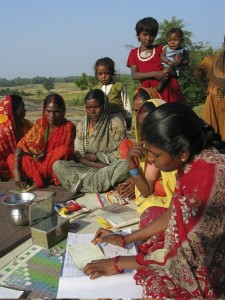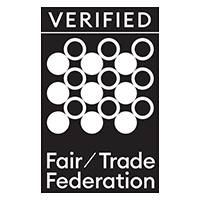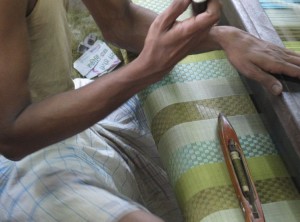Make Every Day Earth Day by Supporting Fair Trade
As many scholars and thoughtful observers have so often pointed out, environmental issues are really social and cultural issues as well. This Earth Day, we at Sevya would like to take a look through a particular lens to observe some of the ways the health of our planet depends upon trading practices that respect the environment and empower the communities that produce goods. Since we work primarily with textiles, our focus will be to compare sustainable, fair trade textile production with conventional factory production. We also want to take this opportunity to introduce our line of fair trade, organic, ayurvedic (herbal medicinal) scarves. No other source for retail or wholesale scarves offers this combination of personal, global and environmental benefits. Moreover, once you have seen this collection you might agree that no other options are as tasteful.

Artisan Women’s Self Help Group. Sevya promotes sustainability for Cooperative Groups through sales of fair trade clothing, retail and wholesale scarves, etc.
This Earth Day it is particularly relevant to consider the fair trade principle called “Cultivating Environmental Stewardship.” From the website for the Fair Trade Federation, the following definition of this principle sums it up: “Fair Trade seeks to offer current generations the ability to meet their needs without compromising the ability of future generations to meet their own needs. Members actively consider the implications of their decisions on the environment and promote the responsible stewardship of resources. Members reduce, reuse, reclaim, and recycle materials wherever possible. They encourage environmentally sustainable practices throughout the entire trading chain.”
This principle is seen in a number of ways in Sevya’s fair trade textile production. First of all, no electricity is used in any stage of handmade textile production. Fixing the dye to yarn is done on wood fires. Ironing is done with coal irons, and washing is all by hand. Our herbal medicinal options use grapefruit extract instead of bleach for whitening and cleaning of the yarn. Bicycle pedal power is employed when spinning of yarn prior to weaving. Weaving is done on pit looms, with foot and hand operated pedal power. Finally, tasseling is by hand.
Sevya’s commitment to sustainability does not stop with zero electricity use. Our herbal dyed and organic cotton options offer the ultimate in eco-friendly materials and process, with significant advantages for both producers and consumers alike. The highest standards of weaving excellence are met in an impressive line of handmade, fair trade organic cotton scarves with ayurvedic, herbal medicinal dyes. The indigo blue example features a light and lovely weave pattern with simple white stripes offsetting the soft indigo hues. Indigo is a natural aid against stress, anxiety and depression. Combined with the aesthetic qualities and softness against the skin, the medicinal effects of indigo complete a perfect package for yourself and the world. Other dye options such as sandalwood, galangal, neem and haritaki cover a wider range of medicinal effects and these scarves also include silk and various weave options. What a novel Earth Day gift idea for self and others!
To these clear and powerful benefits we can add the many benefits to communities of artisans who can realize a sustainable future. The weaving cooperatives allow entire communities a stability and prosperity unheard of in factory models. Consumers who purchase high quality, fair trade ayurvedic scarves are choosing sustainability over the notion that relationships and products can and should be disposable. Consider this: when you make something of high quality that will be cherished, not abused and thrown away quickly, you have made a practical item that deserves respect, earns its keep and is not replaced. We need to nurture this concept with the material world we create as well as in our relationships. What better way to celebrate Earth Day than to invest in a fair trade, organic cotton, ayurvedic-dyed scarf?

Ayurvedic Galangal Fair Trade Cotton Scarf: part of Sevya’s collection of retail and wholesale fair trade scarves
The fact that these fair trade wholesale and retail products employ organic cotton and herbal dyes creates very positive benefits for artisan communities who produce the items. Sustainable production in villages means that artisans are not forced to move to cities where low paid factory jobs are available. Numerous studies in India have shown severe effects to the health of textile workers who are constantly exposed to toxic dyes.
Sevya is committed to offering sustainable solutions to the environmental and social crises facing workers throughout India. After covering operating expenses, Sevya donates whatever is left over to the All India Movement for Seva (AIM for Seva), a highly effective grassroots organization. AIM for Seva strives to create large educational programs while keeping rural villages intact. Dr. Terry Papneja – Donor and President, AIM for Seva, Toronto, Canada, states that: “At AIM for Seva in Canada, we believe that education is the critical factor that draws the line between being able to live a decent life or wallow in poverty.” This organization has been recognized throughout the world for highly effective work in setting up and maintaining schools, building hostels for children to live near schools, and providing everything students need (i.e. school fees, place to stay, food, health care, tutoring, books, uniform, etc.). In concert with Sevya’s efforts to empower sustainable artisan communities, the AIM for Seva work is truly far-reaching, offering positive and lasting alternatives in India.
We at Sevya are inspired by many who do good work in the world; in turn, we hope to also inspire and support effective efforts throughout the world. In this spirit we wish every part of this magnificent world a very, very happy Earth Day. We invite all who are curious about our work to join us in support of these worthy efforts. Namaste.
Jerry Rasch writes for Sevya as a part-time, but full-hearted pursuit.



